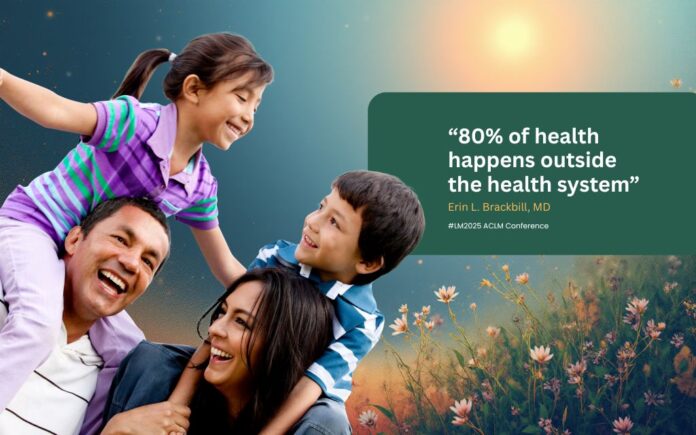A powerhouse panel comprising five keynote speakers and chaired by 17th U.S. Surgeon General Richard Carmona, MD, led the first major conference session of LM2025 in Grapevine, Texas, earlier today.
This session, billed as one that would present bold ideas, real-world examples, and action calls for clinicians, policymakers, and community leaders alike, fully lived up to its hype.
On the stage were a formidable panel of national leaders currently at the intersection of public health and clinical care. The panellists were:
- Richard Carmona, MD, MPH, FACS – Distinguished Laureate Professor, University of Arizona.
- Diana Ramos, MD, MPH, MBA, FACOG – Office of the California Surgeon General.
- Eduardo Sanchez, MD, MPH, FAHA, FAAFP – American Heart Association Centre.
- Erin L Brackbill, MD, FAAP, DipABLM, FACLM – University of South Carolina School of Medicine Greenville/Prisma Health.
- Josie Bidwell, DNP, RN, FNP-C, DipACLM, FACLM – University of Missippi Medical Center.
The topic set for the session was – From Populations to Individual Patients: Bridging the Health and Clinical Care Divide. The expectation was for the panel to explore how lifestyle medicine can be used as an effective framework by systems, clinics, and communities to make the healthy choice the easy choice.
The base problem
Richard Carmona clearly spelt out the base of the problem.
“I’m a recovering surgeon, he said. “I trained as a general vascular surgeon, and after a couple of decades of running trauma centres and emergency centres, and with my background in the military as well, I started realising that most of what I cared for was preventable. And I thought, Gee, this is kind of, I mean, I felt guilty at a point that I know better.
Lifestyle medicine is not just a field — for many health professionals, it is a calling born from lived experience, compassion, and the conviction that prevention can transform lives. At LM2025, three panellists made that message particularly clear.
Carmona, once a trauma surgeon and military physician, realised that most of the suffering he treated was preventable.
His journey from Harlem, the son of immigrants, taught him that social determinants of health are not abstract theories but daily realities — waiting in long lines for care, hoping for food, or struggling to see a dentist. He chose lifestyle medicine to serve humanity at its core, uniting diverse disciplines under one tent with a higher purpose: prevention, wellness, and dignity for all.
For California Surgeon General Diana Ramos, the turning point was Martita, a pregnant diabetic who wished she had known how her condition would affect her baby. That story ignited Ramos’s mission to move beyond individual care and into public health, creating programs that focus on nutrition and prevention.
Early maternity care
Today, she leads initiatives such as the Primer Preconception Medical Assessment, which brings care directly into communities, particularly in areas where maternity health care is scarce. Her vision is clear: prevention must start upstream, empowering families to plan for pregnancy with the same care they give to weddings or education.
Josie Bidwell’s path began with her mother’s long struggle after surgery, teaching her the importance of listening to patients’ stories. As a nurse and later a family nurse practitioner, she saw that true health outcomes were shaped outside hospital walls.
Burnout came when she felt powerless watching preventable decline. That despair became the seed for her lifestyle medicine clinic, where teams of nurse practitioners, dietitians, exercise providers, and counsellors wrap care around patients. Her conviction is unwavering: no one should die from conditions we have the power to prevent.
Paediatrician Erin Bracco expressed deep concern at the rate of childhood obesity.





